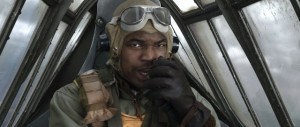
I have no doubt that everyone involved in the making of Red Tails came into the film with the most noble of intentions. The film purports to tell the real-life story of the Tuskegee Airmen, the group of African-American pilots who fought in World War II, and their struggles with racism on the ground. The film also flies under the banner of Lucasfilm, and I genuinely believe George Lucas—when putting his money behind Red Tails—truly wanted to make a movie that illustrates the evils of racism and the difficulties of overcoming it. At the same time, Red Tails has all the earmarks of Lucasfilm production, ultimately taking what is supposed to be serious filmmaking and dragging it into the realm of a goofy popcorn flick. It’s trying to be sincere, but it’s coming from the same man who created Jar Jar Binks.

Of course, Lucas neither wrote nor directed Red Tails, but it looks and feels more like a Star Wars film than it does anything else. There’s the same over-reliance on cartoonish CGI. (Seriously, why did they feel the need to create a green-screen tarmac? Couldn’t they have forked over some of that Star Wars BluRay cash to film on an actual airfield?) There’s also the same stilted dialogue, the cheesy one-liners and the simplified morality—all of which work better in a space opera than in a film about challenging racism during the second World War. The air battles are well done, but too often turn into explosion porn—everything and anything that can blow up does, and in the most spectacular of fashions. The entire Nazi war effort is turned into what appears to be a single, angry German who says things like “Die … You foolish Africans.” Red Tails fancies itself as a crowd pleaser, but really all this does is erode the concept down to the simplest terms imaginable. It’s every bit a dumbed-down, PG-13, family-friendly view of one of the bloodiest, darkest and most pivotal eras in human history.

While the war comes across as cartoonish, the racism in the film seems like more of a prop than an actual obstacle. It’s filled with the kind of slur-spouting racists you’re likely to find in a high-minded after-school special. Compare Red Tails to a movie like Spike Lee’s Miracle at St. Anna (2008), and the differences become obvious. Lee’s film took the exact same topics—racism during WWII, as seen through the eyes of the all-black Buffalo Soldiers—and handled them with much more complexity, shading in the story with Lee’s own views. As a result, it’s hard to see Red Tails as little more than obvious, ham-fisted filmmaking. (Of course, Lee’s film—in its entire run—made less than half what Red Tails has in its opening weekend.)

What this all boils down to is that the Tuskegee Airmen deserve a better film than this one. The performances range from good (Nate Parker and David Oyelowo), to awkward (Cuba Gooding Jr. simply doesn’t have the gravitas needed for his role), to confounding. R&B singer Ne-Yo seems to be channeling Eddie Murphy at his most caricaturish for most of the film, playing for broad comedy, which only dilutes his later serious scenes. All this makes Boondocks comic-strip creator Aaron McGruder’s involvement in the script all the more baffling, as Red Tails feels just the sort of thing he’d normally be making fun of. As a history of the Tuskegee Airmen, Red Tails is embarrassing. As matinee junk, it works only slightly better. Rated PG-13 for some sequences of war violence.




I actually enjoyed Red Tails quite a bit, but when I left the theater, I knew the critics were going to hate it because they wouldn’t see the film for what it actually is. Red Tails is nothing more or less than a modern-day attempt to do the kind of war movie you might have seen in the 1940s (with much better special effects, natch). In this regard, they may have succeeded too well. It fits the style perfectly, but with the drawback that a modern audience would find it unbearably corny. However, that’s the point. The corniness is entirely intentional because that’s how a lot of movies were back then.
When I looked at Rotten Tomatoes, it seems only one critic understood what they were going for and his review was a bit more positive, but most critics took the film at face value and that’s a shame. I hope this won’t turn Aaron McGruder (creator of The Boondocks) off from writing more movies because I think he could do some interesting stuff, given the chance.